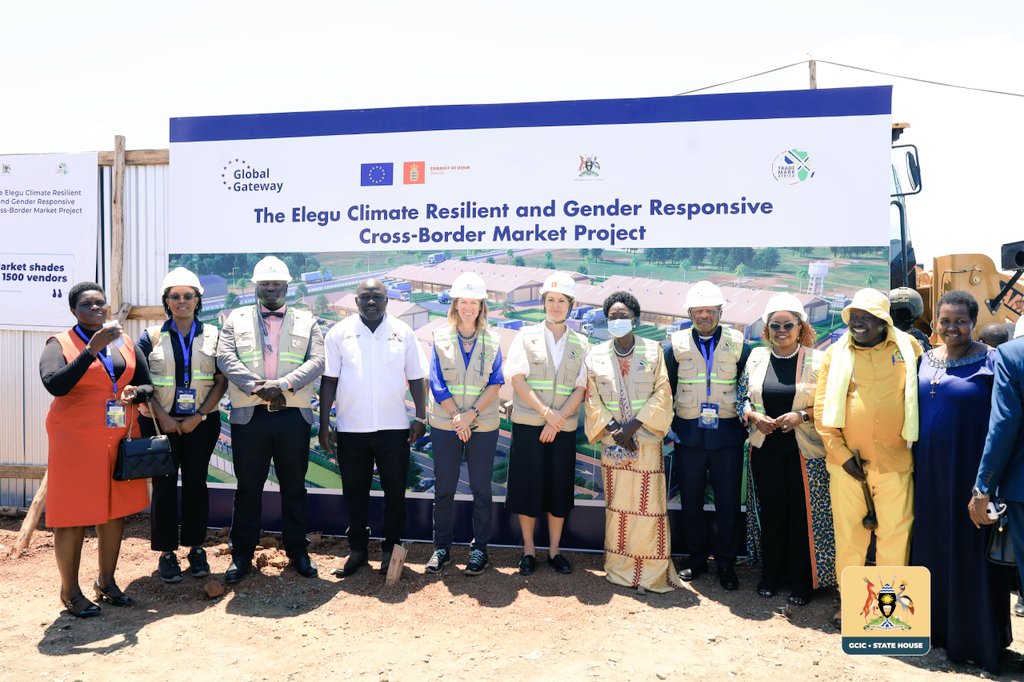Uganda has officially started building its first climate-resilient and gender-responsive cross-border market in Elegu Town Council, Amuru District, a key trade hub along the Uganda–South Sudan border. The 41 billion shillings project is being implemented by TradeMark Africa with funding from Denmark’s DANIDA and the European Union (EU). It aims to protect traders from persistent flooding, empower women and youth, and boost business along the Elegu–Nimule trade corridor.
The construction was flagged off on Wednesday by First Deputy Prime Minister and Minister for East African Community Affairs, Rebecca Alitwala Kadaga. She said the market design directly addresses the flooding caused by the annual bursting of the Unyama River, which has for years left traders counting heavy losses. Once complete, the facility will allow easier cross-border trade not only with South Sudan but also other neighbouring countries, offering traders and transit passengers a safer and more organised space for business.
In a message delivered by Kadaga, Prime Minister Robinah Nabbanja reaffirmed the government’s commitment to improving trade infrastructure, removing bottlenecks, and making Uganda a leader in regional economic integration. “Let us build a market that is not just steel and concrete, but a symbol of transformation where women, youth, and persons with disabilities have space and opportunity,” Nabbanja said. She urged traders to take ownership of the facility and use it to transform their livelihoods, adding that border trade could increase by more than 30% once the market is operational.
The Danish Ambassador to Uganda, Singe Winding Albjerg, said the facility will particularly benefit small-scale traders — especially women — who have been badly hit by climate change impacts. She noted the project’s potential to become a model for other East African border towns if it succeeds.
Sanne Willems, EU Team Leader in Uganda, explained that an EU scoping study in 2024 found that 80% of Elegu market vendors were women who struggled to access South Sudanese markets. She stressed that floods have also damaged agricultural produce, making it hard to meet bio-sanitary standards, and noted that Uganda informally trades about $100 million worth of goods with South Sudan annually, most of it through small-scale traders.
However, Amuru Resident District Commissioner Geoffrey Osborn Oceng warned that other infrastructure issues — such as the poor state of the Gulu–Nimule highway, lack of proper drainage, and weak road networks in Elegu — could still affect trade. He called on the government to also address the River Unyama’s flooding problem directly.
The market’s design incorporates advanced flood-mitigation features, including raising the facility 2.5 metres above known flood levels, reinforced drainage, permeable paving, and stormwater basins. It will also have climate-smart features such as solar panels, cyclone ventilation, rainwater harvesting systems, and modern waste management.
TradeMark Africa’s Deputy CEO, Allen Assimwe, said this is the first market of its kind in Africa, with architects using 30-year climate data to make it resilient to extreme weather. Vendors like Babirye Edith welcomed the development, saying it will end years of hardship caused by floods and fires.
The two-year project, being carried out by Ambitious Construction Company Ltd, will also include modern vendor stalls, sanitation facilities, a banking hall, a restaurant, a daycare centre, loading bays, secure storage, quality control points, and parking space — making it a fully equipped cross-border trade hub.
